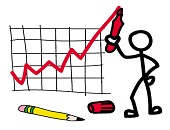Who’s Minding the Bots?
Artificial intelligence (AI) is being implemented in nearly all sectors of the economy at an increasing rate. A 2019 survey by Gartner showed that 37 percent of organizations had already implemented AI in some form. When it comes to integrating AI into your company, what are the risks? What are the opportunities? On March 12, 2021, the Industry Relations and Corporate Governance Committee of the CFA Society Toronto convened a panel of experts to look at how effectively a company’s corporate governance can provide proper oversight and avoid mistakes. In other words, “who and how we will mind the bots.” […]
In Graphic Detail
When trying to present facts and figures to your audience, how can you best convey the information in a memorable fashion? “Through visual presentation,” you might say. Still, this is a very broad area, and it stretches the imagination to devise ways to combine diverse bits of information. It’s a struggle shared by the top practitioners of journalism. On March 4, 2021, two data journalists and an editor from The Economist gave a one-hour behind-the-scenes webinar to discuss the work they do. The Economist was once very skeptical of the need for a data journalism department. Due to the subject […]
Taking Stock
As the covid-19 vaccines continue to be rolled out across the world, how can central banks best counteract the impact of the pandemic? Now might be a good time to pause and reflect on the economic response in Europe. Zanny Minton Beddoes, the editor-in-chief of the magazine the Economist, sat down for an interview with Christine Lagarde, President of the European Central Bank (ECB) on February 10, 2021, to reflect on the challenges Europe faces as it tries to restart its economy while protecting the health of citizens. Lagarde noted the ECB was praised for its quick response in the early […]
Covid Vaccines
“Be careful what you wish for,” the adage goes, “it might come true.” After a year of an ever-broadening pandemic, vaccines have arrived, and thus begins a new round of planning and negotiating. As the first covid-19 vaccines are rolled out across the world, the magazine the Economist assembled a panel on January 14, 2021, to reflect on the challenges. An audience of thousands tuned in as three seasoned journalists discussed global issues related to vaccine development, the risks of misinformation, and the expected impact of an uneven distribution process of vaccines. The panel moderator was Helen Joyce, executive editor for […]
Healthy skepticism
Selecting environmental, social, and governance (ESG) funds is a way that ordinary citizens can invest in an ethical way. But what does the increased interest in ESG investing shown by institutional and private wealth clients really mean? Is it paying off? Are we at a watershed moment for structural change in the way investors allocate resources? The move to consider ESG investing came some years ago with scandals such as Enron, and continues with more scandals such as Volkswagen’s Dieselgate and Facebook’s meddlings, said Pedro Matos, a professor of finance at University of Virginia and the author of the CFA […]
Private Equity in “the new normal”
From pandemic to protectionism, global events and trends are having an impact on the private equity (PE) markets. From a Canadian perspective, what effect are these issues having on the alignment between PE investors and PE fund managers? In Toronto on July 9, 2020, Helen Pham welcomed three panellists to the webinar titled, “Private Market Trends: Improving Alignment Between Investors and Managers.” The webinar was organized by the institutional asset management committee of the CFA Society Toronto. The panellists shared their thoughts on how investors should view effects of the global pandemic on private equity markets and the associated risks […]
The Value of Data
What is the value of data? Who benefits from data? Can you construct a decent predictive model to manage risk if you have lousy data? Some enterprising souls have tried to sell their data back to the tech giants that collect and use big datasets. There are even some small companies such as CitizenMe and Datum that pay a user for taking a quiz or sending location data. “Data are far from becoming a standardized commodity whose value can readily be established through trades,” writes Diane Coyle, professor at University of Cambridge, in a report she tabled February 26, 2020, […]
More Leaves than Grapes?
Who says the market on old books is in a downward spiral? Luca Pacioli wrote the definitive treatise Summa de Arithmetica, Geometrisa, Proportioni et Proportionalita and published it in Venice in 1494. On June 12, 2019, Christie’s put up one copy for auction. (The starting price was one million USD; it eventually sold for 1.2 million USD.) Experts estimate 120 copies of this book still exist. An image of a typical page, reproduced here, shows its type font is somewhat less readable than the modern accounting textbook. Summa de Arithmetica was widely read and used at the time. It contains real-life examples, […]
Geopolitical Risk
What’s with Russia and cyber-hacking? How did it happen, and why? Geopolitical risk threatens the very fundamentals of market stability and the world order. The Global Association of Risk Professionals treated its members to a “big picture” risk topic during the webinar on November 1, 2017. Former senior US intelligence officer Jack Thomas Tomarchio, who is now a principal with the Agoge Group, LLC, described the current geopolitical risk due to Russian cyber-attacks. “Russia was declared to be responsible for leaks at the Democratic National Convention in 2016,” Tomarchio said. “The DNC is supposed to be neutral, but the leaks […]
“The Death of the Soul”
Do you long for the good old days? What, exactly, were “the good old days”? Depends on your time horizon. Today’s excerpt comes from page 11 of Economic Thought: A Brief History by Heinz D. Kurz, translated by Jeremiah Riemer (Columbia University Press, 2016). “According to Scholastic economic thought, the answer to the material hardship experienced by large segments of the [medieval European] population was not higher production and economic growth but self-restraint and the repression of needs. “The heart of Scholasticism was the doctrine concerning usury. A core argument was that money is sterile—it cannot “breed offspring.” Another argument […]










